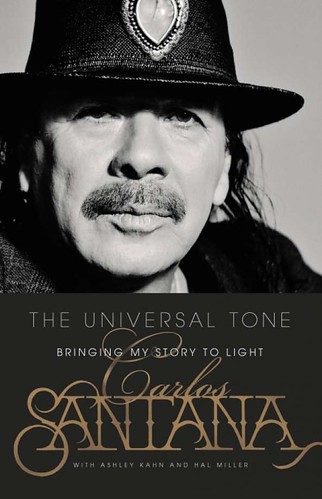 Subtitled "Bringing My Story To Light," this is musician Carlos Santana's life story. His life began in Autlán, Mexico; he came of age in Tijuana; eventually ended up in San Francisco; and now he inhabits the entire world.
Subtitled "Bringing My Story To Light," this is musician Carlos Santana's life story. His life began in Autlán, Mexico; he came of age in Tijuana; eventually ended up in San Francisco; and now he inhabits the entire world.
The Universal Tone was published by Little, Brown and Company in 2014. It's a massive book, totaling 536 pages, and that's not counting the numerous pages of photographs, dating back to Santana's childhood. The book was one of NPR's Best Books of 2014 and winner of the 2015 American Book Award. The Universal Tone also received a starred review in Kirkus (and anyone who knows Kirkus knows that it is nearly impossible to even get reviewed by Kirkus, let alone receive a starred review!)
was published by Little, Brown and Company in 2014. It's a massive book, totaling 536 pages, and that's not counting the numerous pages of photographs, dating back to Santana's childhood. The book was one of NPR's Best Books of 2014 and winner of the 2015 American Book Award. The Universal Tone also received a starred review in Kirkus (and anyone who knows Kirkus knows that it is nearly impossible to even get reviewed by Kirkus, let alone receive a starred review!)
Here are a few select excerpts from the book; these all focus on Santana's music influences and learning:
From Chapter 3:The blues is a very, very no-nonsense thing. It's easy to learn the structure of the songs, the words and the riffs, but it's not like some other styles of music—you can't hide behind it. Even if you are a great musician, if you want to really play the blues you have to be willing to go to a deeper place in your heart and do some digging. You have to reveal yourself. If you can't make it personal and show an individual fingerprint, it's not going to work. That's really where you find the magnificence in the simple three-chord blues, in the fingerprints of blues guitarists like T-Bone Walker, B. B. King, Albert King, Freddie King, Buddy Guy, and all the cats from Chicago—Otis Rush, Hubert Sumlin.There's a lot of misunderstanding about the blues. Maybe it's because the word means so many things. The blues is a musical form—twelve bars, three chords—but it's also a musical feeling expressed in what notes you play and how you play each note. The blues can also be an emotion or a color. Sometimes the difference is not so clear. You can be talking about the music, then the feeling, then what's in the words of a song. John Lee Hooker singing, "Mmm, mmm, mmm—Big legs, tight skirt / 'Bout to drive me out of my mind..." It's all the blues.
From Chapter 4:Charlie Parker said, "If you don't live it, it won't come out of your horn." I began to live my life, and my own sound began to come out of that closet and out of my guitar. It took a while—lots of gigs in Tijuana and in San Francisco. Lots of life experiences—growing up, leaving home, and coming back. Then, ultimately, leaving home for good.When you take your time and listen to the real blues guys, you discover that each one has his own sound and you can recognize them by things they do, all while realizing that they don't repeat themselves. When you really dig into a blues it's like riding a horse bareback in the night under full moonlight. The horse takes off, and he doesn't throw you off. You go up and down and flow with the rhythm of the ride, go through all these changes, and never repeat yourself.
Also from Chapter 4:I started to learn about phrasing, mainly from singers. Even today, as much as I love T-Bone or Charlie or Wes or Jimi, it's singers more than other guitar players that I like to hang with. If I want to practice or just get reacquainted with my instrument, I think it's best to hang with a singer. I don't sing, but I will put on music by Michael Jackson and I'll be right there with his phrasing, like a guided missile—I'll do the same thing with Marvin Gaye and Aretha Franklin. Or Dionne Warwick's first records—my God. So many great guitarists play a lot of chords and have great rhythm chops, and I can do that. But instead of worrying about chords or harmony, I'll just try matching Dionne's vocal lines, note for note.I began to really learn about soloing and respecting the song and the melody. I think too many guitar players forget that and get stuck in the guitar itself, playing lots of notes—"noodling," I call it. It's like they're playing too fast to pay attention. Some people thrive on that, but sooner or later the bird's got to land in the mist and you got to play the melody. Imagine if the song was a woman—what would she say? Did you forget me? Are you mad at me?I still hear what Miles Davis used to say about musicians who play too much: "You know, the less you play the more you get paid for each note."

No comments:
Post a Comment